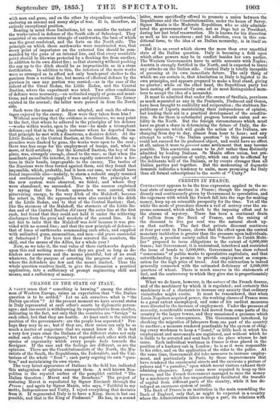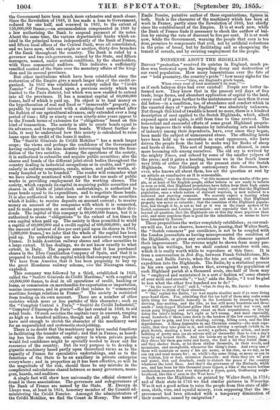CREDITS IN FRANCE.
CoNmecrioN appears to be the true expression applied to the ac- tual state of money-matters in France'; though the impulse stu- diously and continuously given by Government to speculation, and the eagerness with which the French fall into the rage for making money, keep up an ostensible prosperity for the time. Yet all the while the mode of procedure throws a veil of secrecy over the su- preme command, which adds both to the imposing effect and to the alarms of mystery. There has been a continual drain of bullion from the Bank of France, and the raising of the discount to five per cent was the natural oheok up- on that outflow. The• fact that private discount continues at four per cent in France, shows that the effect upon the central monetary institution is greater than the pressure upon individuals. Recently, a peculiar society called the "Societe de Credit Mobi- Her " proposed to issue obligations to the extent of 6,000,000 francs ; but Government, it is understood, interfered and restricted the issue of bonds to 3,000,000; Government has since refused " concessions " of public works to speculative capitalists, and that notwithstanding its promise to provide employment as come:11 sation for the high price of bread. And the contraction is in. eed generally connected with the estimated deficiency of 2,000,000 quarters of wheat. There is much reserve in the statements of fact, and the controversy to which they give rise is proportionately obscure.
What we do know, however, is the nature of the French finance, and of the machinery by which it is regulated ; and certainly this machinery is of a character to increase any anxiety that ordinary vicissitudes might excite. It must be remembered, that when Louis Napoleon acquired power, the working classes of France were to a great extent unemployed, and some of his earliest measures were directed to the increase of employment. Under the pressure of necessity, considerable numbers had moved from some parts of the country to the larger towns, and they occasioned a pressure which threatened grave consequences. The Government interfered, by checking the migration of labourers from one part of the country to another; a measure rendered praoticable by the system of oblig- ing every workman to keep a "hvret," or little book in which his employment and movements are registered, and without which he is liable to be arrested and sent back to the place whence he last came. Each individual workman in France is thus placed in the
position of a hackney-cab in London ; he is as it were responsible to his rider, and on the application of the rider to the pohee. At
the same time, Government did take measures to increase employ- ment, and particularly in Paris, by those improvements that have rendered the ornamental streets and the environs a picture of palaces and "a paradise," upon which recent visitors exhaust their
admiring eloquence. Large sums were required to keep up this process, and the French Government managed to raise the money by a machinery which has unquestionably facilitated the transfer of capital from different parts of the country, while it has de. veloped an enormous system of credit. Bank of France is an institution in the main resembling the Bank of England, only that, as might be expected in a country where the Administration takes so large a part, its relations with
the Government have been much more extensive and much closer. Since the Revolution of 1848, it has made a loan to Government, reduced by one half, and renewed in 1852, to the extent of 150,000,000 francs;—an aecommodation compensated in 1848 by a law authorizing the Bank to suspend payment of its notes. About the same time, the various departmental banks which ex- isted in the principal towns independently of the Bank of France, and fifteen local offices of the Central Bank, were all consolidated, and we have now, with one origin or another, thirty-five branches of the Bank throughout the country. The Bank is ruled by a governor and two sub-governors, named by the State, and fifteen manners, named, under certain conditions, by the shareholders, with three commercial auditors. This indicates a sufficiently ramified control of the State over the monetary affairs of the king- dom and its several provinces. But other institutions which have been established since the restoration of the Empire give a much larger idea of the credit or- ganized. In 1852 was established a society called the "Credit Fonder" of France, based upon a previous society which was limited to the Paris district, but which was now enabled to extend into all the provinces. It has a nominal capital of 60,000,000 francs, half of which is paid up. Its object is to lend money on the hypothecation of real and fixed or "immoveable" property, re- payable by annual interest with a sinking-fund somewhat after the fashion of our agricultural advances, only extended over a long period of time ; fifty or ninety or even ninety-nine years appear to be the French terms of extension for "obligations" based on this kind of transaction. The society is able to create bonds equal to its advances, and to negotiate those bonds. Without further de- tails, it may be understood how this society is calculated to raise loans upon the credit of the loans it makes.
The "Societe Generale de Credit Mobilier " has a much larger scope; the views and perhaps the confidence of the Government having enlarged in the nine months intervening between the foun- dation of the two societies. Among the operations of the society, it is authorized to subscribe and acquire public securities; also the shares and bonds of the different joint-stock bodies throughout the country dealing in industrial occupations or in credits, and "parti- cularly in railway companies canals, mines, and public works, al- ready founded or to be founded." The reader will remember what we have already mentioned with respect to the use made of public works in providing employment for the working classes. The society, which expends its capital in acquiring public securities and shares in all kinds of joint-stock undertakings, is authorized to issue bonds equal to its expenditure, and to negotiate those bonds. It is also authorized to raise loans or to exchange the securities which it holds; to receive deposits on account current ; to receive money on account of the companies with which it is connected, and to make payments on account of their coupons or their divi- dends. The capital of this company is 60,000,000 francs, but it is authorized to create " obligations " to the extent of ten times its own capital when paid up. The society is thus permitted to wield a capital of 60,000,000 and a credit capital of 600,000,000; and by the amount of interest of five per cent paid upon its shares in 1854, [3,000,000 francs,] we infer that the whole of the capital has been paid up. Its undertakings are also most extensive even beyond France. It holds Austrian railway shares and other securities to a large extent. It has dealings, we do not know exactly to what extent, in Italy. The papers announce that it has purchased shares in the Ebro Canalization Company of Spain, and that it is prepared to furnish all the capital which that company may require. We bear from America that it has been proposing to buy up the great Honduras railway scheme, vice the Nicaragua canal, exploded.
This company was followed by a third, established in 1853, called the "Societe Generale de Credit Maritime," with a capital of 50,000,000 francs, to deal in all operations of credit, banking or loans, or commission on merchandise for exportation or importation, marine insurances, and in general all that relates to "commercial maritime foreign relations in France." The society is restricted from trading on its own account. There are a number of other societies which more or less partake of this character ; such as the " Comptoir Central a Paris," "Societe du Credit Industrie]," " Comptoir d'Escompte de Paris "—the last created in 1848, to aid retail trade. Of such societies the capitals vary in amount, ranging as high as a hundred millions, though not all paid up. But we have said enough to sketch the character of the machinery used for an unparalleled and systematic stockjobbing. There is no doubt that the machinery may have useful functions in facilitating the transfer of capital; and that in France, as hoard- ing has been the custom, some agency in whom private people would feel confidence might be specially needed to draw out the resources of the country. But its very purpose is to develop a gigantic machinery based partly upon theoretical views as to the capacity of France for speculative undertakings, and as to the functions of the State to be an auxiliary in private enterprise everywhere ; and in proportion as it has been effective, so will be the magnitude of the risk, should there be any mistake in the complicated calculations shared between so many governors, mana- gers boards, and auditors. A:single fact will show how universally the official element is found in these associations. The governors and sub-governors of the Bank of France are named by the State. M. Dronyn de Lhuys was, at least in 1854, honorary member of the Council ad- ministering the Credit Fonder. Amongst the administrators of the Credit Mobilier, we find the Count de Moray. The name of Emile Pereire, putative author of these organizations, figures in both. Such is the character of the machinery which has been at work in France, partly since the Revolution of 1848, but chiefly since the establishment of the Empire. It is at work now, while the Bank of France finds it necessary to check the outflow of bul- lion by raising the rate of discount to five per cent. It is at work now, while the Government, warning the people that corn is too dear, promises to compensate that evil, not by artificial reductions in the price of bread, but by facilitating and so cheapening the transit of cereals, and by creating employment for the people. •



































 Previous page
Previous page